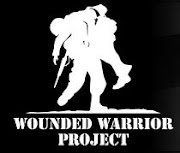
Chris Ayers
A native of Houston, Texas, Chris Ayers joined the Marines in 1995 to find positive direction in his life in a structured environment. Chris loved the work and flourished in the service, becoming a machine gunner. He briefly left the service after the birth of his first child, but re-enlisted in 1999.
In March of 2003, Chris' unit, First Battalion, Fifth Marines, deployed to the Al Anbar Province in Iraq. Two weeks after Chris arrived in Iraq, four Blackwater military contractors were killed in Fallujah, launching Operation Resolve, also known as the First Battle of Fallujah.
During the battle, Chris led a group of Marines to clear an area where supply vehicles had been attacked. Before they could reach the area, they were ambushed. Chris and his fellow Marines ran a gauntlet of fire from rocket-propelled grenades (RPGs) and small-arms fire. One of the RPGs killed the group's gunner. Another ripped through Chris, blowing off all of the soft tissue on the back of his leg. After the blast, Chris passed in and out of consciousness. He prayed to make it home to see his wife and daughter one more time.
Chris' companions pulled him to a nearby house, where a corpsman applied a tourniquet and radioed for help. The house was surrounded by enemies, and it took nearly an hour and a half for a rescue party to fight their way in. Chris was air lifted out, and he woke up in Landstuhl, Germany before being transferred to Brooke Army Medical Center (BAMC) in Texas, where he stayed for two and a half months.
Luckily, the blast didn't break Chris' femur or sever the femoral artery, and he was able to keep his leg. The injury did damage Chris' sciatic nerve, leaving him with numbness in his leg and a perpetual feeling that his leg is asleep. It was nearly two months before Chris was able to get out of bed, and he had to learn to walk without his hamstring muscle. It took more than six months before Chris was able to walk on his own.
Chris considers himself lucky not only to have his leg, but also to return to his family. He is deeply thankful for the skill of his fellow Marines, whom he credits for saving his life. "For them to do the things they did during that difficult situation was totally phenomenal," Chris explains.
Chris recently joined team WWP to head up the Project's post-traumatic stress initiatives. He first heard about WWP when he received a signature WWP backpack at BAMC. Since his injury, he's been amazed by the increase in programs available to the wounded, and has stepped forward to do what he can to help. "I've met some incredible individuals who want to help veterans and some amazing veterans themselves." Chris' wife Renee has been involved too, talking with spouses of wounded warriors and connecting them with resources and support.
Chris sums it up with, "I'm passionate about what I'm doing, and I just think it's the right thing to do. I really like the Wounded Warrior Project because they're active with veterans and keep them involved. They think outside the box. It's just a phenomenal organization."






No comments:
Post a Comment